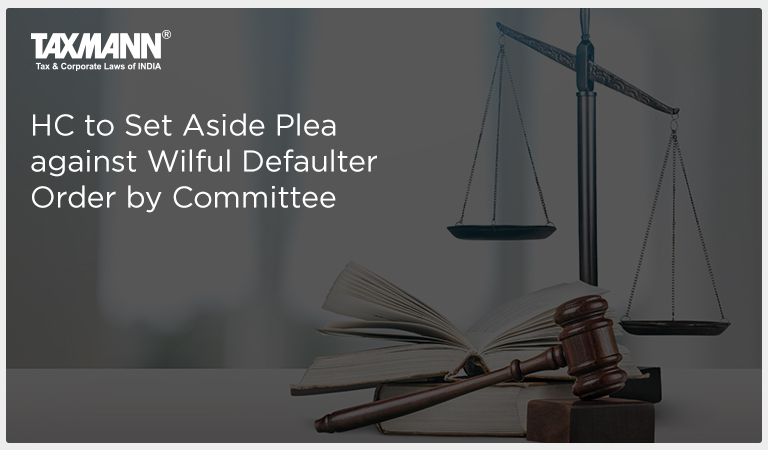HC to Set Aside Plea against Wilful Defaulter Order by Committee
- Blog|News|FEMA & Banking|
- 2 Min Read
- By Taxmann
- |
- Last Updated on 10 May, 2023

Case Details: Ramesh Chandra Bardia v. State Bank of India - [2023] 149 taxmann.com 402 (HC - Calcutta)
Judiciary and Counsel Details
-
- Sabyasachi Bhattacharyya, J.
- Mainak Bose, Ms. Urmila Chakraborty, Rishav Karnani and Pranav Sharma, for the Petitioner.
- Joy Saha, Anirban Pramanick and Ms. Subhasree Dey for the Respondent.
Facts of the Case
The Review Committee (RC) affirmed the order of the Identification Committee. Consequently, the Petitioners challenged those orders in a writ petition. The petitioner’s case was that all transfers of funds to subsidiaries and investments were made with the full knowledge of consortium members.
Also, the diversion of funds of lenders without necessary consent could not be explained by contending that such advances/diversions were within the 20% cap as per the terms of the sanction.
Subsequently, a composite reading of IC and RC orders indicated that ample reasons were given while coming to decisions in both orders and there was no complaint that the borrower was not allowed to make full representation before both Committees.
Further, there was no scope of the instant Court to sit in an appeal over the decision of Committees, more so since, there was no jurisdictional error apparent on the face of records, nor could there be found any fault in the decision-making process adopted by respondent authorities.
High Court Held
The High Court held that the orders of IC and RC could not be said to be vitiated by any irregularity or patent miscarriage of justice whatsoever. Therefore, the instant writ against the order of IC whereby the petitioners were identified as wilful defaulters and an RC order confirming the same was to be dismissed.
Case Review
-
- Suresh Kumar Patni v. Punjab National Bank [2020] 122 taxmann.com 246/[2021] 164 SCL 683 (Cal.) and Kejriwal Mining (P.) Ltd. v. Allahabad Bank [2020] 117 taxmann.com 443/160 SCL 316 (Cal.) (para 61) distinguished.
- West Bengal Central School Service Commission v. Abdul Halim [2019] 18 SCC 39 (para 47) followed.
List of Cases Referred to
-
- Axis Bank Ltd. v. Gaurav Dalmia [CAN 4729 of 2020, dated 24-8-2020] (para 14),
- State Bank of India v. Jah Developers (P.) Ltd. [2019] 105 taxmann.com 189/154 SCL 72 (SC) (para 15),
- Suresh Kumar Patni v. Punjab National Bank [2020] 122 taxmann.com 246/[2021] 164 SCL 683 (Cal.) (para 15),
- Kejriwal Mining (P.) Ltd. v. Allahabad Bank [2020] 117 taxmann.com 443/160 SCL 316(Cal.) (para 16) and
- West Bengal Central School Service Commission v. Abdul Halim [2019] 18 SCC 39 (para 40)
Disclaimer: The content/information published on the website is only for general information of the user and shall not be construed as legal advice. While the Taxmann has exercised reasonable efforts to ensure the veracity of information/content published, Taxmann shall be under no liability in any manner whatsoever for incorrect information, if any.

Taxmann Publications has a dedicated in-house Research & Editorial Team. This team consists of a team of Chartered Accountants, Company Secretaries, and Lawyers. This team works under the guidance and supervision of editor-in-chief Mr Rakesh Bhargava.
The Research and Editorial Team is responsible for developing reliable and accurate content for the readers. The team follows the six-sigma approach to achieve the benchmark of zero error in its publications and research platforms. The team ensures that the following publication guidelines are thoroughly followed while developing the content:
- The statutory material is obtained only from the authorized and reliable sources
- All the latest developments in the judicial and legislative fields are covered
- Prepare the analytical write-ups on current, controversial, and important issues to help the readers to understand the concept and its implications
- Every content published by Taxmann is complete, accurate and lucid
- All evidence-based statements are supported with proper reference to Section, Circular No., Notification No. or citations
- The golden rules of grammar, style and consistency are thoroughly followed
- Font and size that’s easy to read and remain consistent across all imprint and digital publications are applied



 CA | CS | CMA
CA | CS | CMA
